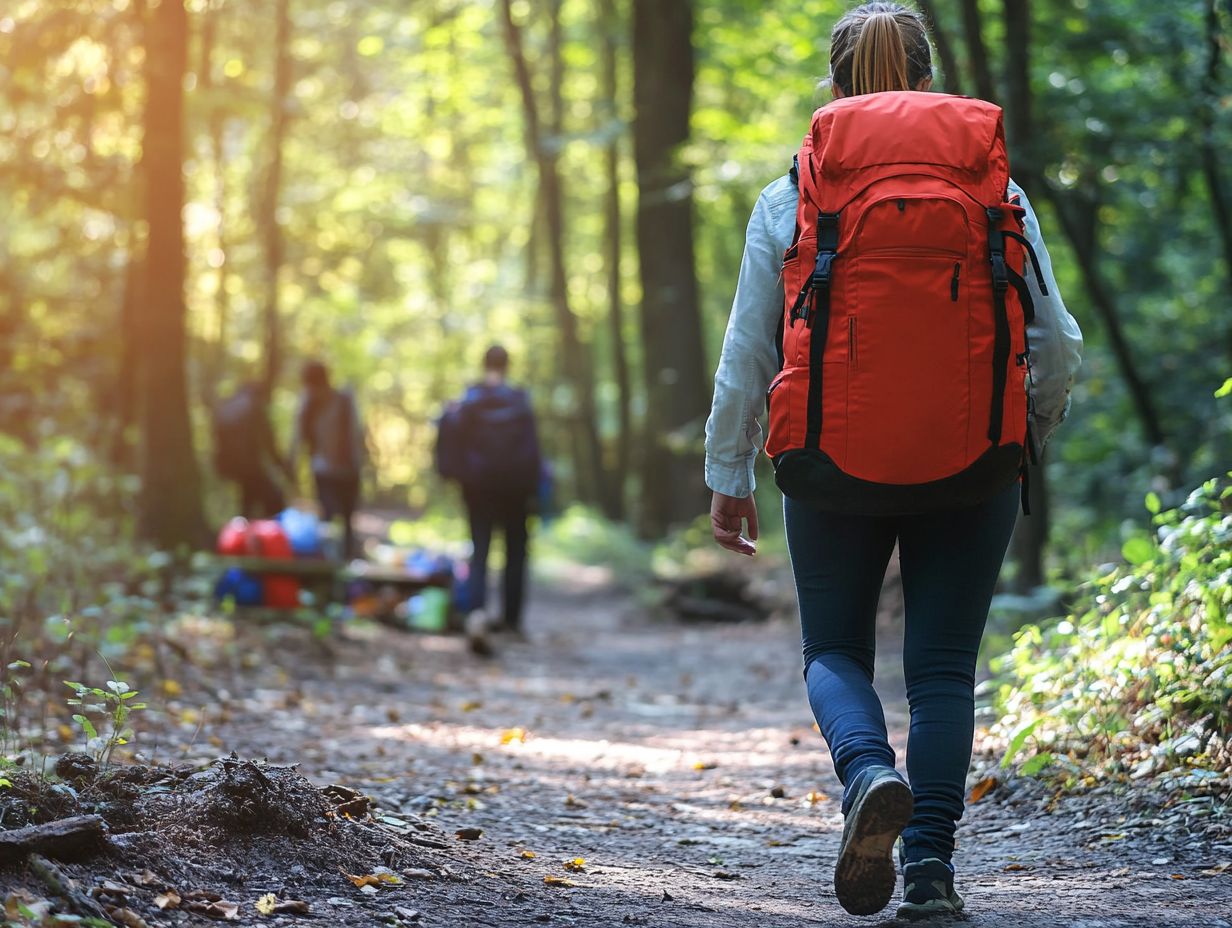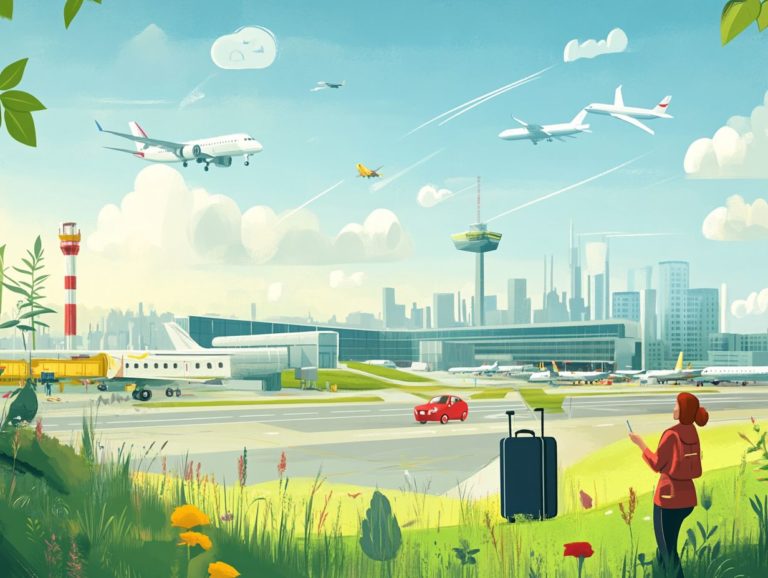5 Ways to Stay Green While Traveling
Traveling can be an enriching experience, but it s crucial for you to recognize the environmental impact of your explorations and embrace sustainable travel practices.
From packing reusable items to selecting eco-friendly accommodations, there are countless ways to make your adventures more sustainable and engage in eco-friendly tourism.
This article offers five practical travel tips for maintaining a green approach during your travels while highlighting the significance of environmentally conscious travel.
Whether you are a seasoned traveler or preparing for your first journey, discover how you can leave a positive footprint on the planet and support local communities along the way.
Contents
- Key Takeaways:
- 1. Pack Reusable Items
- 2. Choose Eco-Friendly Accommodations
- 3. Use Public Transportation or Walk
- 4. Support Local and Sustainable Businesses
- 5. Minimize Water and Energy Usage
- Why Is It Important to Be Environmentally Conscious While Traveling?
- Frequently Asked Questions
- Here are 5 easy ways to travel green!
- Why is it important to stay green while traveling?
- How can using public transportation contribute to staying green while traveling?
- Why should I choose eco-friendly accommodations?
- What are some other ways to reduce my environmental impact while traveling?
- How can I support the local community while traveling?
Key Takeaways:

- Choose reusable items like water bottles and utensils to reduce waste while traveling.
- Stay at eco-friendly accommodations that use sustainable practices and support the local community.
- Opt for public transportation or walk to minimize your environmental impact while exploring your destination.
1. Pack Reusable Items
Packing reusable items is crucial for eco-conscious travelers who want to minimize waste and promote sustainable travel practices.
In today s world, single-use plastics are a major contributor to environmental degradation and carbon emissions, so every little bit counts.
By including practical items such as stainless steel water bottles, cloth shopping bags, and reusable utensils in your travel kit, you can significantly reduce your reliance on single-use plastic and disposables.
Studies indicate that using reusable bottles can save nearly 167 plastic bottles per person each year, leading to a remarkable decrease in plastic waste.
Eco-friendly destinations like Costa Rica are setting the standard, encouraging visitors to adopt sustainable habits. These efforts safeguard local ecosystems and foster a sense of collective responsibility for preserving our planet.
With each trip you take, you contribute to a greener future, making your travels more impactful.
2. Choose Eco-Friendly Accommodations
Choosing eco-friendly accommodations is vital for sustainable travel and eco-tourism.
These establishments often implement green practices certified by organizations like Green Globe and EarthCheck, ensuring they minimize their environmental footprint while contributing to the economic growth of local communities.
By opting for eco-certified stays, you support a healthier planet and enhance your own experience as a guest.
Take the Park Terrace Hotel; it stands out for its dedication to sustainability, focusing on energy efficiency and waste reduction.
These hotels also preserve cultural heritage by incorporating local traditions and materials into their services.
Ultimately, selecting eco-friendly options nurtures the environment and supports local economies, ensuring that communities thrive and heritage is both cherished and maintained.
3. Use Public Transportation or Walk
Utilizing public transportation or walking reduces your carbon footprint and elevates your travel experience.
This allows you to immerse yourself in the local culture while practicing sustainable travel and eco-friendly tourism.
By opting for these methods, you help decrease traffic congestion, making city streets more navigable for everyone.
Public transit systems often boost local businesses, as easy access translates to increased foot traffic, benefiting shops and restaurants along the routes.
In destinations like Mexico, discover exciting eco-friendly options, such as buses powered by renewable energy sources, bike-sharing programs, and volunteering opportunities to further minimize your environmental impact.
Embracing public transportation supports sustainable practices and fosters community engagement and development.
Start planning your eco-friendly adventure today!
4. Support Local and Sustainable Businesses

Supporting local and sustainable businesses is essential for community growth. This ensures that tourism dollars circulate within local economies, benefiting both local businesses and eco-friendly tourism.
Choosing these businesses creates job opportunities and promotes practices that prioritize environmental health. Imagine a local coffee shop sourcing beans from fair-trade, organic farms, or an artisan bakery using ingredients from nearby farms to reduce its carbon impact.
When you spend your money with local establishments, you help preserve cultural heritage. Many uphold traditional methods and recipes that reflect the unique identity of the area. This choice diminishes the financial power of global corporations and fosters a resilient economy that celebrates its cultural narratives.
5. Minimize Water and Energy Usage
Minimizing water and energy usage while traveling is crucial for environmental sustainability. It helps you reduce your impact on the environment and protect local resources.
Adopting mindful habits during your stay lets you contribute to preservation efforts. Simple actions, like taking shorter showers or turning off the tap while brushing your teeth, can significantly cut down water usage.
Choose accommodations with energy-efficient appliances or renewable energy sources, like solar panels. This not only lowers carbon output but also sets a positive example for the local community.
Engaging in low-impact activities like hiking or cycling can enhance your travel experience and protect natural habitats. These small choices can drive meaningful change for our planet.
Why Is It Important to Be Environmentally Conscious While Traveling?
Being environmentally conscious while traveling directly affects local communities and ecosystems. By balancing tourism growth with environmental sustainability, you help preserve cultural heritage and natural resources for future generations.
This awareness can lead to significant economic benefits for locals. It fosters job creation and supports small businesses through eco-friendly tourism initiatives. Sustainable practices honor cultural identities and promote responsible resource use.
Organizations like the World Tourism Organization (UNWTO) promote these sustainable practices. They provide guidelines that help destinations implement strategies to protect their environments while enjoying the economic benefits of a thriving tourism sector.
What Are the Benefits of Sustainable Travel?
Sustainable travel offers many benefits, from boosting local economies to preserving cultural heritage. It enhances the well-being of communities and ecosystems.
By exploring local attractions and supporting small businesses, you help create jobs and stimulate economic growth. Initiatives to reduce carbon emissions are essential; they protect natural resources and empower communities to adapt to climate change.
The societal benefits are compelling too. Sustainable travel fosters a sense of belonging and community growth through shared experiences. It promotes cultural exchange, amplifies local pride, and supports social sustainability, allowing communities to thrive while preserving their unique identities.
How Can Sustainable Travel Help Local Communities?

Sustainable travel has a remarkable way of uplifting local communities. It generates income through eco-friendly tourism, fosters economic sustainability, and empowers residents to engage in practices that preserve their cultural heritage.
Take Costa Rica, for example. It stands as a shining example of sustainable tourism. The country prioritizes conservation and biodiversity through responsible practices and eco-tourism initiatives. When you choose eco-lodges and participate in thoughtfully planned tours that respect local ecosystems, you re not just enjoying the breathtaking biodiversity; you’re also contributing to community development.
Similarly, Palau showcases its unwavering commitment to marine conservation with its Pledge to Protect policy. This policy invites tourists to embrace environmentally friendly practices. These initiatives elevate your experience as a traveler and provide essential economic support to local communities. This allows them to flourish while preserving their unique cultural identities and promoting social sustainability.
What Are the Common Greenwashing Practices in the Travel Industry?
Common greenwashing practices in the travel industry can easily mislead travelers. These practices present superficial environmentally friendly claims that fall short of true sustainable travel practices. This ultimately diminishes the valuable efforts of genuinely sustainable businesses.
You might encounter misleading certifications that sound impressive but lack the necessary standards. Vague terminology creates an illusion of eco-friendliness, while false advertising exaggerates a company’s sustainability efforts.
To navigate this intricate landscape, educate yourself on identifying authentic sustainable practices. Research recognized and reputable certifications. Seek out transparent information about a travel provider’s operations, such as how they source materials responsibly and minimize waste. Additionally, consider following best practices for sustainable road trips to enhance your eco-friendly travel experience.
By supporting organizations that genuinely practice sustainability, you ensure your travel choices contribute to a healthier planet and promote ethical practices within the industry. Additionally, learning how to reduce plastic use when traveling can further enhance your eco-friendly efforts.
How Can Travelers Offset Their Carbon Footprint?
You can effectively offset your carbon footprint by supporting initiatives that reduce carbon emissions. Consider participating in renewable energy projects and conservation efforts. This makes a considerable impact on sustainable travel.
Participating in carbon offset programs means investing in projects that capture or prevent emissions equivalent to your own travel activities. To further enhance your travel experience, consider adopting top sustainable travel practices like taking public transportation, using electric vehicles, or staying in eco-friendly accommodations. These choices minimize your environmental impact and enhance your travel experience.
Engaging in local volunteering opportunities, such as tree planting or wildlife preservation projects, lets you contribute directly to conservation efforts. This also fosters a deeper connection to the places you visit. Each of these strategies collectively elevates responsible tourism, paving the way for a healthier planet for future generations.
Join the movement! Explore eco-lodges on your next trip and make a difference today!
What Are Some Tips for Responsible and Sustainable Souvenir Shopping?
Engaging in responsible and sustainable souvenir shopping means selecting items that support local businesses and celebrate the rich cultural heritage of your destination. This practice promotes sustainable travel and contributes to the economic well-being of the area.
To elevate your shopping experience, consider wandering through market stalls and artisan shops. Here, you can ensure that the products are ethically sourced and crafted by local artisans. This approach preserves unique traditions and helps you connect more deeply with the community.
As you contemplate a purchase, ask about the sustainability of the materials used. Opting for handmade treasures over mass-produced trinkets is a step toward environmentally-friendly travel. Avoiding single-use plastic souvenirs is essential, as these contribute to environmental degradation.
Investigate how your purchases impact local communities. This helps you make informed choices that empower communities and support their growth.
Frequently Asked Questions

Here are 5 easy ways to travel green!
- Use public transportation or walk as much as possible instead of renting a car or taking taxis. This helps reduce carbon emissions.
- Bring a reusable water bottle and fill it up at water fountains to avoid buying plastic bottles.
- Choose eco-friendly accommodations such as hotels with sustainability practices or camping in nature.
- Pack light to reduce the weight on transportation and save on fuel.
- Support local businesses and try to avoid large chain restaurants and stores.
Why is it important to stay green while traveling?
Traveling greatly affects our environment, from carbon emissions to waste and pollution. By staying green, we can reduce our carbon footprint and help preserve the places we visit for future generations, supporting eco-tourism.
How can using public transportation contribute to staying green while traveling?
Using public transportation reduces the number of cars on the road, which in turn lowers carbon emissions. It also allows you to experience the local culture and support the local economy, benefiting local businesses.
Start your responsible travel journey today and make a positive impact!
Why should I choose eco-friendly accommodations?
Eco-friendly accommodations reduce their environmental impact. They follow standards set by organizations like the World Tourism Organization and the Global Sustainable Tourism Council.
These places often use renewable energy, recycle, and incorporate sustainable materials. Your choice helps them make a real difference!
What are some other ways to reduce my environmental impact while traveling?
Stay green on your travels by using biodegradable toiletries and choosing activities that support conservation. Be mindful of your energy and water usage as well.
How can I support the local community while traveling?
Supporting local businesses helps the economy and enriches your travel experience. Buy souvenirs from local artisans, eat at local restaurants, and join local tours to truly engage with the culture.






